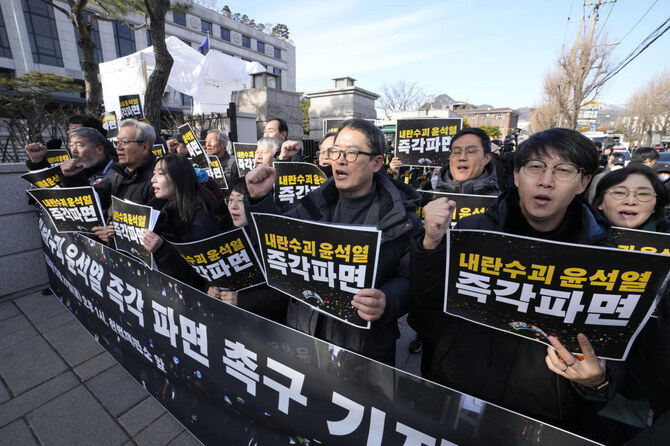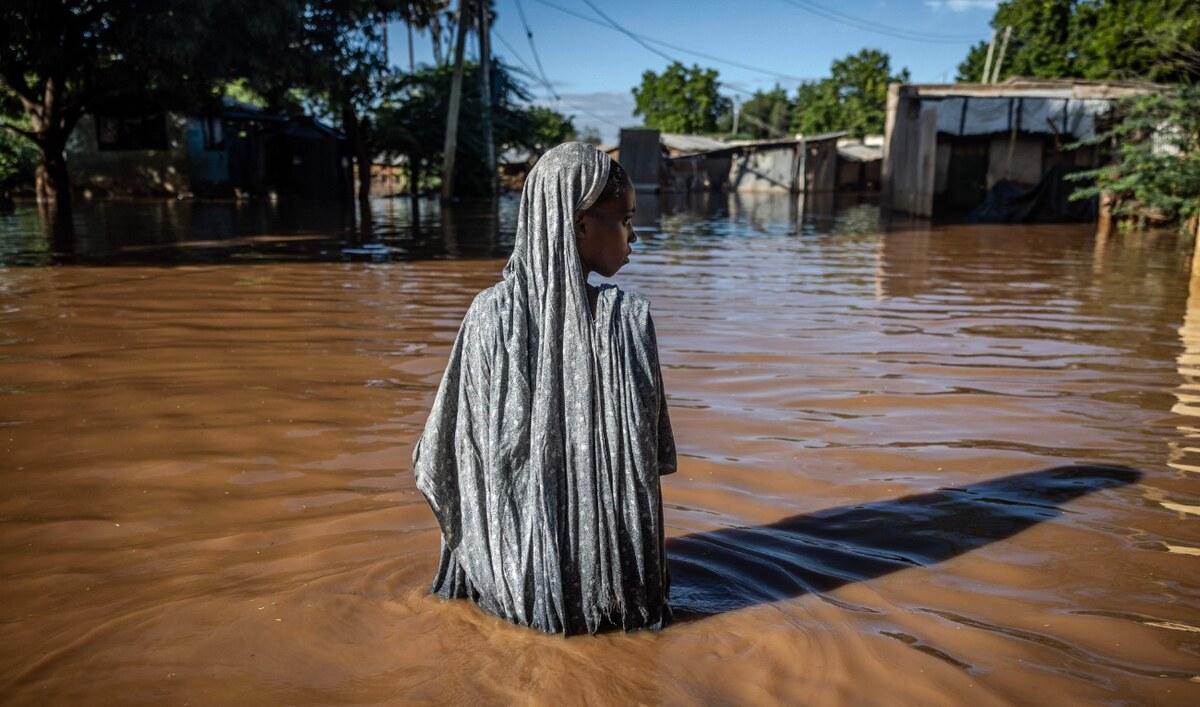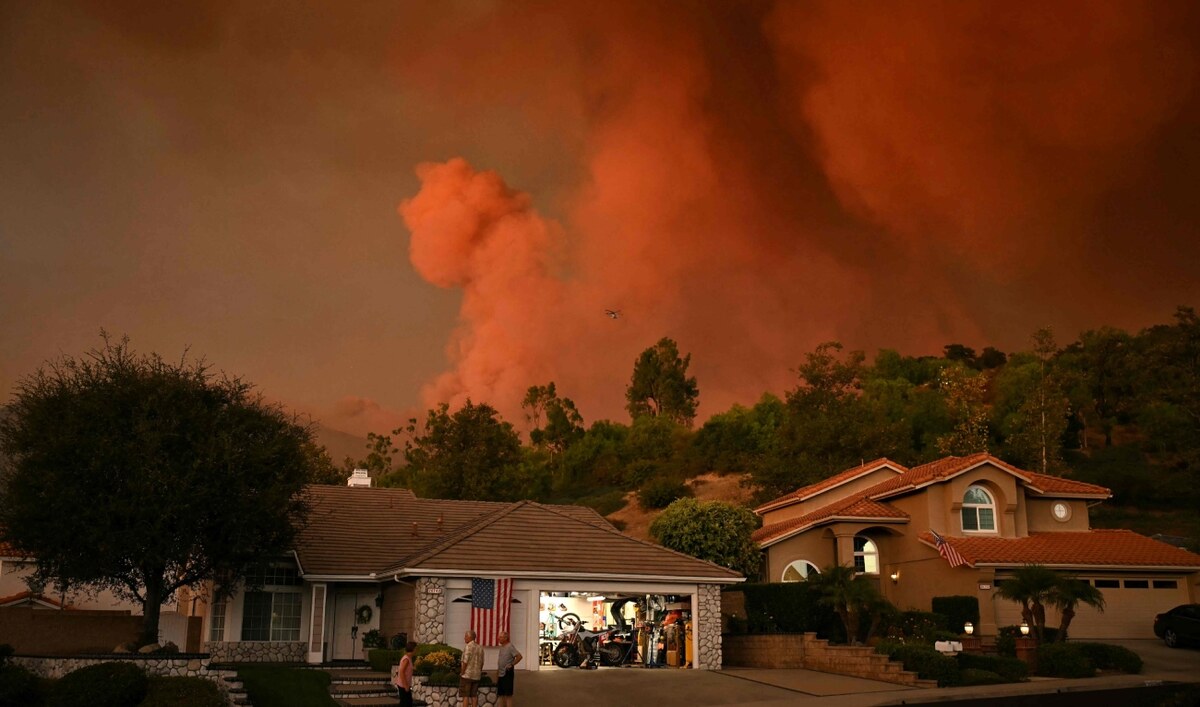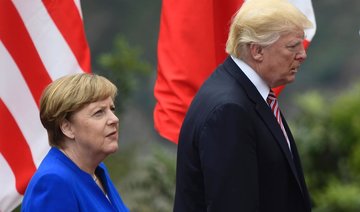WASHINGTON: Donald Trump, just back from his first international trip as US president, geared up to combat concerns Sunday over aides’ ties to Russia including explosive reports that his son-in-law sought a secret communications line with Moscow.
The latest furor was stirred up after The Washington Post reported late Friday that Jared Kushner — arguably Trump’s closest White House aide, and husband to the president’s eldest daughter Ivanka — made a pre-inauguration proposal to the Russian ambassador to set up a secret, bug-proof link with the Kremlin.
Kushner, 36, even suggested using Russian diplomatic facilities in the US to protect such a channel from monitoring, The Post said, quoting US officials briefed on intelligence reports.
The report, if confirmed, would raise new questions about the Trump team’s relationship with the Russians, who US intelligence agencies say tried to sway the November election in Trump’s favor.
News reports said the White House, reeling from the explosive developments in the long-running Russia saga, is creating a new rapid-fire communications unit to respond to the controversy, led by Kushner, senior presidential adviser Steve Bannon and White House Chief of Staff Reince Priebus.
Though Kushner has appeared “subdued,” he does not plan to step aside as Trump’s senior adviser or reduce his responsibilities, the New York Times reported, citing unnamed people close to him.
After some delay, a senior Trump administration official en route back to Washington briefed reporters for almost 25 minutes, on matters from anti-terror cooperation to the administration’s view that the summit had been a smashing success — despite huge differences on climate change.
Trump plans to make an announcement within the week on his climate position, the official said.
But the said official did not address the Kushner reports Saturday.
Trump then returned to Washington Saturday night from his first overseas trip, to the Middle East and Europe. Accompanied by first lady Melania, Trump waved to reporters as he made his way into the White House but made no comment.
National Security Adviser H.R. McMaster refused to talk about the allegations. But he said that in general, “We have backchannel communication with a number of countries. What that allows you to do is communicate in a discrete manner.”
“I would not be concerned about it,” he added.
But a former head of the US National Security Agency harshly condemned Kushner’s alleged effort to set up a secret communications line, saying if it is true, it would reveal a dangerous degree of ignorance or naivete.
“What manner of ignorance, chaos, hubris, suspicion, contempt would you have to have to think that doing this with the Russian ambassador was a good or appropriate idea?” Michael Hayden said on CNN.
He said he leaned toward “naivete” as an explanation, though he did not find it comforting.
Malcolm Nance, a retired naval officer and expert on terrorism and intelligence, said: “This is now sinister. There is no way this can be explained, from the intelligence perspective.”
“That is indicative of espionage activity of an American citizen that is working in league with a hostile government,” he told MSNBC.
The Washington Post said Kushner’s secret communications proposal was made on Dec. 1 or 2 at Trump Tower in New York, according to intercepts of Russian communications that were reviewed by US officials.
Michael Flynn, who was Trump’s national security adviser for just 24 days before being fired amid questions about meetings he held with the Russian ambassador, was also present, the newspaper reported.
The Post said the Russian ambassador to the US, Sergei Kislyak, was surprised by the future White House aide’s idea of a secret channel and passed it on to the Kremlin.
The New York Times said the channel was never established.
Trump returned to Washington to face a cascade of other worries related to the Russia probe in the coming days, including expected testimony by fired former FBI director James Comey before a Senate committee.
In another development, The New York Times reported Friday that Oleg Deripaska, a Russian once close to Trump’s former campaign manager Paul Manafort, has offered to cooperate with congressional bodies probing alleged Russian election meddling.
Kushner boasts an enormous portfolio of domestic and international responsibilities underscoring his importance as Trump’s chief aide-de-camp, despite having no experience in politics before the 2016 White House race.
He is the only person currently in the White House known to be under investigation.
The Post and other media have been careful to note that their sources did not say Kushner was a “target” of the investigation, nor that he was accused of any wrongdoing. Labeling him a “target” would suggest Kushner was a main suspect of the investigation.
But there have been a number of as yet unexplained contacts — during last year’s presidential campaign against Democrat Hillary Clinton and afterward — between other top Trump aides and senior Russian officials, including Flynn, US Attorney General Jeff Sessions, Manafort and others.
The investigation is being led by Robert Mueller, a respected former FBI director who was given broad powers to pursue the case as a special counsel after Trump abruptly fired Comey on May 9.
The Senate and House Intelligence committees also are investigating, but not with an eye to bringing criminal charges.
Former CIA director John Brennan revealed this week that intelligence chiefs had been looking into suspicious contacts between Trump campaign associates and Russian officials since mid-2016.
Trump denies any collusion with Russia, calling the probe “the greatest witchhunt” in American political history.
Sounds of silence as Russia probe pierces Trump’s inner circle
Sounds of silence as Russia probe pierces Trump’s inner circle

South Korea’s parliament impeaches acting president Han Duck-soo

- The motion led by opposition parties passed with 192 of the 300 votes amid rowdy scenes by ruling People Power Party members
SEOUL: South Korea’s parliament impeached acting President Han Duck-soo on Friday over a short-lived martial law, plunging the country deeper into political chaos, as the Constitutional Court said it would swiftly trial suspended President Yoon Suk Yeol.
The impeachment of Han, who has been acting president since Yoon was impeached on Dec. 14 for declaring martial law on Dec. 3, has thrown South Korea’s once-vibrant democratic success story into uncharted territory.
The motion led by opposition parties passed with 192 of the 300 votes amid rowdy scenes by ruling People Power Party members who surrounded the speaker’s podium chanting the vote was invalid and parliament had committed “tyranny.”
Ahead of the parliamentary session, opposition leader Lee Jae-myung said his Democratic Party, which has majority control of parliament, will go ahead with the plan to impeach the acting president, accusing Han of “acting for insurrection.”
“The only way to normalize the country is to swiftly root out all the insurrection forces,” Lee said in a fiery speech, adding the party was acting on the public order to eradicate those who have put the country at risk.
There has been overwhelming public support for Yoon’s removal, according to opinion polls conducted after his martial law attempt.
The plan for a vote to impeach Han was unveiled on Thursday by the main opposition Democratic Party after he declined to immediately appoint three justices to fill vacancies at the Constitutional Court, saying it would exceed his acting role.
Until just before voting began, it was unclear how many votes were needed to impeach Han as acting leader. The threshold for a prime minister is a simple majority, while a two-thirds majority is needed for a president.
Speaker Woo Won-shik declared a simple majority would constitute parliamentary approval.
Han said in a statement after the vote that he would step aside to avoid more chaos and will await a Constitutional Court ruling on his impeachment.
By law Finance Minister Choi Sang-mok will assume the acting presidency.
Choi earlier pleaded with parliament to withdraw the plan to impeach Han, saying it would do serious damage to the country’s economy.
The South Korean won retreated to 1,475.4 per dollar, down 0.53 percent at 0707 GMT ahead of the parliamentary vote.
The vote to determine Han’s fate comes on the same day the Constitutional Court held its first hearing in a case reviewing whether to overturn the impeachment and reinstate Yoon or remove him permanently from office. It has 180 days to reach a decision.
North Korean soldier captured in Ukraine died from injuries – South Korea’s spy agency

- The soldier was captured by the Ukrainian army
- Location where he was seized was unknown
SEOUL: South Korea’s spy agency said Friday it had confirmed that a North Korean soldier sent to back Russia’s war against Ukraine had been captured by Ukrainian forces.
Pyongyang has deployed thousands of troops to reinforce Russian troops, including in the Kursk border region where Ukraine mounted a shock border incursion in August.
“Through real-time information sharing with an allied country’s intelligence agency, it has been confirmed that one injured North Korean soldier has been captured,” South Korea’s National Intelligence Service said in a statement.
The soldier was captured by the Ukrainian army, an intelligence source told AFP, adding that the location where he was seized was unknown.
The first confirmation of the capture of a North Korean soldier came days after Ukrainian President Volodymyr Zelensky said Monday that nearly 3,000 North Korean soldiers had been “killed or wounded” so far.
Seoul’s Joint Chiefs of Staff (JCS) also said Monday that more than 1,000 North Korean soldiers have been killed or wounded.
The JCS had also said that Pyongyang is reportedly “preparing for the rotation or additional deployment of soldiers” and supplying “240mm rocket launchers and 170mm self-propelled artillery” to the Russian army.
Seoul’s military believes that North Korea was seeking to modernize its conventional warfare capabilities through combat experience gained in the Russia-Ukraine war.
North Korean state media said Friday that Russian President Vladimir Putin sent a New Year’s message to North Korean leader Kim Jong Un, saying “the bilateral ties between our two countries have been elevated after our talks in June in Pyongyang.”
A landmark defense pact went into effect in December after the two sides exchanged ratification documents.
Putin hailed the deal in June as a “breakthrough document.”
‘Dangerous new era’: climate change spurs disaster in 2024

- This year was hottest in history, with record-breaking temperatures in atmosphere, oceans acting like fuel for extreme weather
- World Weather Attribution said nearly every disaster they analyzed over the past 12 months was intensified by climate change
PARIS: From tiny and impoverished Mayotte to oil-rich behemoth Saudi Arabia, prosperous European cities to overcrowded slums in Africa, nowhere was spared the devastating impact of supercharged climate disasters in 2024.
This year is the hottest in history, with record-breaking temperatures in the atmosphere and oceans acting like fuel for extreme weather around the world.
World Weather Attribution, experts on how global warming influences extreme events, said nearly every disaster they analyzed over the past 12 months was intensified by climate change.
“The impacts of fossil fuel warming have never been clearer or more devastating than in 2024. We are living in a dangerous new era,” said climate scientist Friederike Otto, who leads the WWA network.
That was tragically evident in June when more than 1,300 people died during the Muslim Hajj pilgrimage in Saudi Arabia where temperatures hit 51.8 degrees Celsius (125 degrees Fahrenheit).
Extreme heat — sometimes dubbed the ‘silent killer’ — also proved deadly in Thailand, India, and United States.
Conditions were so intense in Mexico that howler monkeys dropped dead from the trees, while Pakistan kept millions of children at home as the mercury inched above 50C.

Greece recorded its earliest ever heatwave, forcing the closure of its famed Acropolis and fanning terrible wildfires, at the outset of Europe’s hottest summer yet.
Climate change isn’t just sizzling temperatures — warmer oceans mean higher evaporation, and warmer air absorbs more moisture, a volatile recipe for heavy rainfall.
In April, the United Arab Emirates received two years worth of rain in a single day, turning parts of the desert-state into a sea, and hobbling Dubai’s international airport.
Kenya was barely out of a once-in-a-generation drought when the worst floods in decades delivered back-to-back disasters for the East African nation.

Four million people needed aid after historic flooding killed more than 1,500 people across West and Central Africa. Europe — most notably Spain — also suffered tremendous downpours that caused deadly flash flooding.
Afghanistan, Russia, Brazil, China, Nepal, Uganda, India, Somalia, Pakistan, Burundi and the United States were among other countries that witnessed flooding in 2024.
Warmer ocean surfaces feed energy into tropical cyclones as they barrel toward land, whipping up fierce winds and their destructive potential.
Major hurricanes pummelled the United States and Caribbean, most notably Milton, Beryl and Helene, in a 2024 season of above-average storm activity.
The Philippines endured six major storms in November alone, just two months after suffering Typhoon Yagi as it tore through Southeast Asia.
In December, scientists said global warming had helped intensify Cyclone Chino to a Category 4 storm as it collided head-on with Mayotte, devastating France’s poorest overseas territory.
Some regions may be wetter as climate change shifts rainfall patterns, but others are becoming drier and more vulnerable to drought.
The Americas suffered severe drought in 2024 and wildfires torched millions of hectares in the western United States, Canada, and the Amazon basin — usually one of Earth’s wettest places.
Between January and September, more than 400,000 fires were recorded across South America, shrouding the continent in choking smoke.

The World Food Programme in December said 26 million people across southern Africa were at risk of hunger as a months-long drought parched the impoverished region.
Extreme weather cost thousands of lives in 2024 and left countless more in desperate poverty. The lasting toll of such disasters is impossible to quantify.
In terms of economic losses, Zurich-based reinsurance giant Swiss Re estimated the global damage bill at $310 billion, a statement issued early December.
Flooding in Europe — particularly in the Spanish province of Valencia, where over 200 people died in October — and hurricanes Helene and Milton drove up the cost, the company said.
As of November 1, the United States had suffered 24 weather disasters in 2024 with losses exceeding $1 billion each, government figures showed.
Drought in Brazil cost its farming sector $2.7 billion between June and August, while “climatic challenges” drove global wine production to its lowest level since 1961, an industry body said.
Court hearing set for man accused of fatally burning woman on New York City subway

- Sebastian Zapeta, a Guatemalan citizen who entered the US illegally, has been jailed at the city’s Rikers Island complex
- Authorities say Zapeta approached the woman and set her clothing on fire with a lighter, then sat on a bench and watched as she burned
NEW YORK: A court hearing is scheduled Friday for the man accused of setting a woman on fire on a New York City subway train and fanning the flames with a shirt as she burned to death.
Sebastian Zapeta has been charged with two counts of murder and one count of arson for the apparently random attack, which occurred early Sunday morning on a train stopped in Brooklyn.
The 33-year-old man made his first court appearance earlier in the week. He was not required to enter a plea, and his attorney has not responded to requests for comment.
The victim has not yet been publicly identified by police.
Zapeta, who federal immigration officials said is a Guatemalan citizen who entered the US illegally, has been jailed at the city’s Rikers Island complex.
Authorities say Zapeta approached the woman, who might have been sleeping on the train at the Coney Island station stop, and set her clothing on fire with a lighter. He waved a shirt at her to fan the fire, causing her to become engulfed in flames, prosecutor Ari Rottenberg said during the court appearance Tuesday.
Zapeta then sat on a bench on the platform and watched as she burned, prosecutors allege. The woman was pronounced dead at the scene.
Police took Zapeta into custody while he was riding a train on the same line later that day.
Zapeta told investigators that he drinks a lot of liquor and did not know what had happened, according to Rottenberg. However, Zapeta did identify himself in photos and surveillance video showing the fire being lit, the prosecutor said.
A Brooklyn address for Zapeta released by police after his arrest matches a shelter that provides housing and substance abuse support.
Federal immigration officials said he was deported in 2018 but returned to the US illegally sometime after that.
India announces state funeral for ex-PM Manmohan Singh

- Manmohan Singh, who held office from 2004 to 2014, died at the age of 92 late Thursday evening at a hospital in New Delhi
- The official date for the funeral was not announced, but a member of Congress party suggested it would be held on Saturday
NEW DELHI: India on Friday announced seven days of state mourning after the death of former Prime Minister Manmohan Singh, one of the architects of the country’s economic liberalization in the early 1990s.
Singh, who held office from 2004 to 2014, died at the age of 92 late Thursday evening at a hospital in New Delhi. He will also be accorded a state funeral.
“As a mark of respect for the departed dignitary, it has been decided that seven days of state mourning will be observed throughout India,” the Indian government said in a statement Friday, with mourning running until January 1.
“It has also been decided that the state funeral will be accorded to late Dr. Manmohan Singh,” it said, adding that the national flag will also be flown at half-mast.
India’s cricket team battling hosts Australia in the fourth Test took to the ground Friday with black arm bands to show respect for Singh.
The official date for the state funeral was not immediately announced, but a senior member of the Congress party suggested it would be held on Saturday.
The former premier was an understated technocrat who was hailed for overseeing economic boom in Asia’s fourth-largest economy in his first term but his second stint ended with a series of major corruption scandals, slowing growth, and high inflation.
The unpopularity of Singh in his second term, and a lacklustre leadership by Nehru-Gandhi scion Rahul Gandhi, the current leader of opposition in the lower house, led to the first landslide victory for Prime Minister Narendra Modi in 2014.
Born in 1932 in the mud-house village of Gah, in what is now Pakistan, Singh studied economics to find a way to eradicate poverty in the vast nation and never held elected office before taking the nation’s highest office.
He won scholarships to attend both Cambridge, where he obtained a first in economics, and Oxford, where he completed his doctorate.
Singh worked in a string of senior civil service posts, served as a central bank governor and also held various jobs with global agencies such as the United Nations.
He was tapped in 1991 by then Congress prime minister P.V. Narasimha Rao to reel India back from the worst financial crisis in its modern history
In his first term Singh steered the economy through a period of nine-percent growth, lending the country the international clout it had long sought.
He also sealed a landmark nuclear deal with the US that he said would help India meet its growing energy needs.


















